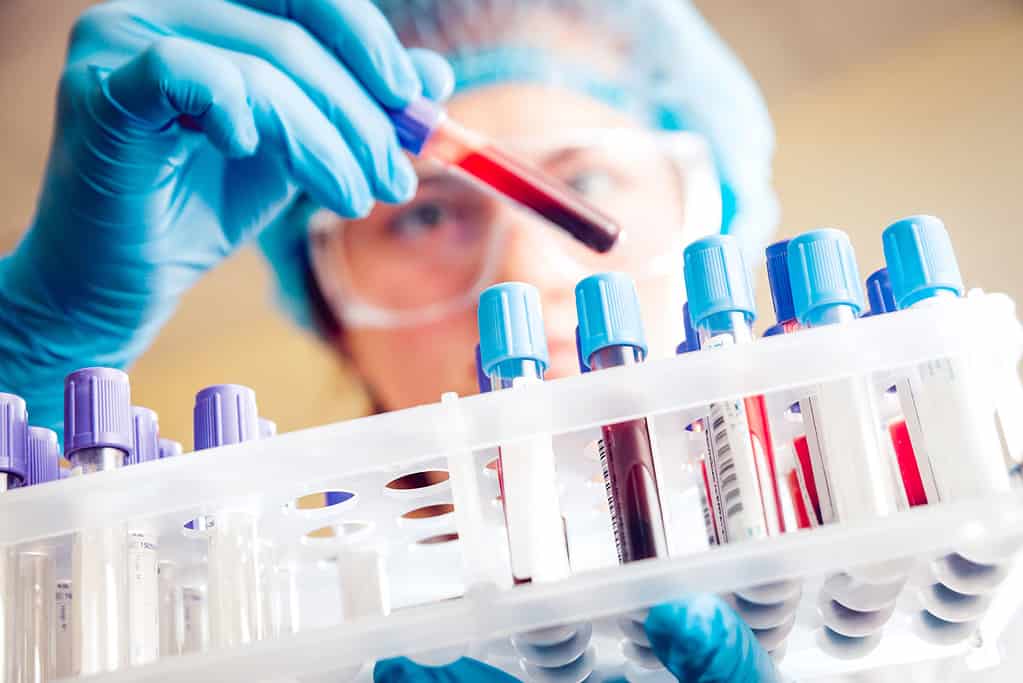MitochondrialRelated to the mitochondria. conditions, as a group, are thought to affect about 1 in 4,300 people. However, there are many people living with a mitochondrial condition who remain undiagnosed or misdiagnosed. Since people with mitochondrial conditions can have so many different symptoms that can be more or less severe based on the person, diagnosing these conditions can be challenging.
Find nearby doctors who specialize in Mitochondrial diseases
Our searchable directory makes it easy to find a doctor or facility specializing in diagnosing and treating mitochondrial disorders.
Health and Family History
The diagnosis of mitochondrial conditions usually begins by gathering a personal and family history, and with a detailed physical examination.
Doctors will ask questions about common features of mitochondrial conditions including:
- Extreme tiredness or fatigueThe overall feeling of tiredness or lack of energy. It is not the same as simply feeling drowsy or sleepy. Being fatigued means having no motivation or energy.
- Muscle pain or weakness
- Growth
- SeizuresEpisodes of abnormal electrical activity in the brain.
- Vision changes
- Hearing changes
- Known problems in the heart, liver or kidneys
- Gastrointestinal (GI)Problems in the stomach or intestines. signs like nausea, vomiting, constipation or diarrhea
- Hormone changes or diabetes
- History of infection
- Changes in behavior or memory
Doctors may also ask about family history. It is important to note that people with a mitochondrial condition can have different symptoms or be more severely affected than others, even in the same family. Some people in a family may not even know that they have a mitochondrial condition if it does not impact their daily life very much.

Before your first appointment, it can be helpful to gather information about your family’s health including:
- What conditions or symptoms each person has
- When symptoms first began
- If a cause was ever found for their features
Physical Tests
Based on the reported personal and family history, a doctor may order some physical tests. These can differ based on the condition a doctor is suspicious of, but can include:
- Neuroimaging. These tests look at the structure of the brain or estimate the amount of certain brain metabolites. Tests can include:
- Magnetic Resonance Imaging (MRI)
- Spectroscopy
- Computed Tomography (CT)
- Proton Magnetic Resonance Imaging (MRS)
- Diffusion Tensor Imaging
- Electromyography (EMG)A diagnostic procedure to assess the health of muscle and nerve cells that control each. and nerve conduction studies (NCS/NCV). These tests look at the electrical activity in the muscles.
- Vision and eye tests. These tests tend to be more involved than those typically done when someone is getting a prescription for eyeglasses or contact lenses. These can include:
- Dilated Fundus examinations
- OCT imaging
- Visual Acuity screening
- Color testing
- Slit Lamp examination
- Hearing screening.
- Heart studies. These tests can look for both structural changes and abnormal heart rhythms.

Blood, Urine, and Spinal Fluid Tests
Doctors may also order testing in urine, blood (serumClear liquid part of blood, with blood cells and clotting proteins removed. or plasma), or the spinal fluid (CSF).
These can include:
- Complete blood count (CBC)
- Organic acid analysis
- Amino acid analysis
- Total and free carnitine levels, and acylcarnitines
- Thyroid function studies
- Other biomarkers like:
- Lactate
- Pyruvate
- Creatine phosphokinase
- Transaminases
- Albumin
- Quantitative 3MG
- Uric acid
- 5-methyltetrahydrofolate
- FDF21
- Glutathione
- Neopterin
Muscle or Other Tissue Biopsy Tests
Biopsy testing is used to directly see mitochondrial changes in the muscle or other tissue like the liver. To do this testing a small piece of muscle tissue is taken from specific parts of the body. This testing has historically been considered the “gold standard” for diagnosing mitochondrial conditions. However, this has begun to change in recent years. The most recent consensus guidelines state that this testing should be done when the diagnosis cannot be confirmed with DNA testing.
Genetic Testing
Mitochondrial conditions can be caused by genetic changes, sometimes called mutationsgenetic variant, genetic change or variantsSpecific change in the DNA. in the DNA. Depending on the condition in question, a doctor may order testing on two different types of DNA: Nuclear DNA (nDNA) Mitochondrial DNA (mtDNA). The nDNA, is the set of DNA found in the nucleus of every cell and is inherited from both parents. The mtDNA, is the set of DNA contained in the mitochondria of a cell and is inherited from the mother through her eggs.
There is not one genetic test that can tell doctors everything about the nuclear or mitochondrial DNA. Some tests look for changes in the sequence, or “spelling”, of a gene. Others look to see if there are small missing or extra pieces of DNA or look for large missing or extra pieces of DNA.
Different types of genetic tests can look for:
- One specific genetic change known to be common in a gene (site-specific testing)
- Changes in a single gene
- Changes in multiple genes (panel testing)
- Changes across the whole exome (WES), meaning all coding parts of the DNA
- Change on the whole genome (WGS), meaning the entire DNA including non-coding regions
If someone has whole genome (WGS) or whole exome (WES) testing, doctors usually need to specifically order testing of the mitochondrial DNA (mtDNA) if they would like the mtDNA reviewed.
It is possible for some people with a mitochondrial condition to have a negative genetic testing. Genetic testing can be performed on multiple tissue types including blood, saliva, and tissue. There are benefits and limitations to testing each sample type.
Challenges to Diagnosis
Every single cell in the body has its own mitochondria. If there is a genetic change in the mitochondrial DNA, the percentage of mitochondria that have this genetic change (percent heteroplasmyApplies to variants in mitochondrial DNA. Homoplasmy is the presence of only one variant, in a given mitochondrial gene, in an individual. Heteroplasmy is the presence in an individual of two more var) can be different in each cell. This can cause different parts of the body to be more affected than others. Even if a biopsy of one tissue type is not able to find mitochondrial changes, this does not mean that there could not be mitochondrial changes in other parts of the body.
Learn More about Testing:
Expert Series: What You Should Know About Genetic Testing for Mitochondrial Disorders
Expert Series: Whole Genome Sequencing for Rare Disorders: The Future Is Here
References:
Parikh, S., Goldstein, A., Koenig, M. K., Scaglia, F., Enns, G. M., Saneto, R., Anselm, I., Cohen, B. H., Falk, M. J., Greene, C., Gropman, A. L., Haas, R., Hirano, M., Morgan, P., Sims, K., Tarnopolsky, M., Van Hove, J. L. K., Wolfe, L., & DiMauro, S. (2015, September). Diagnosis and management of mitochondrial disease: A consensus statement from the Mitochondrial Medicine Society. Genetics in medicine : official journal of the American College of Medical Genetics. Retrieved October 20, 2022, from https://www.ncbi.nlm.nih.gov/pmc/articles/PMC5000852/
Last Update: 2022OCT21 J. Dronen, CGC, ThinkGenetic, Inc.










